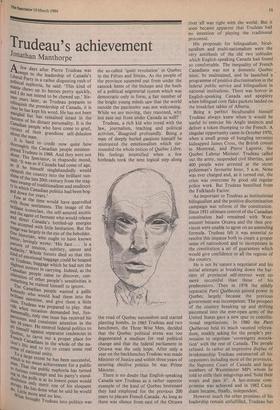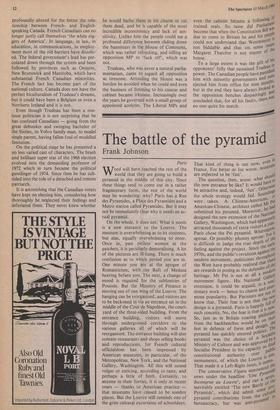Trudeau's achievement
Jonathan Manthorpe
Aswept to the leadership of Canada's after Pierre Trudeau was Liber few days Party in a rather disgusting rush of Political euphoria, he said: 'This kind of Mania chews up its heroes pretty quickly, and I do not intend to be chewed up.' Six- teen years later, as Trudeau prepares to relinquish the premiership of Canada, it is Clear he has kept his word. He has not been mangled but has remained intact in the fastness of his distant personality. It is the Canadian people who have come to grief, victims of their
about the man, grandiose self-delusion
It is hard to credit now quite how thoroughly the Canadian people misinter- preted Trudeau in 1968. And they were not alone. The Spectator, in rhapsodic mood, said: It was as if Canada had come of age, as if he himself singlehandedly would catapult the country into the brilliant sun- shine of the late 20th century from the stag- nant swamp of traditionalism and mediocri- ty in which Canadian politics had been bog- geddown for years.'
with th
Few at the time would have quarrelled ose sentiments. The image of the brilliant iconoclast, the self-assured ascetic and the agent of ferment who would release and direct Canada's bottled-up energies Was accepted with little hesitation. But the ,irriage was largely in the eye of the beholder. Jne historian, who ought to have known better, lovingly wrote: 'His face is a Pattern of tension, subtlety, unrest and alc. dacitY2 Whole forests died so that this slit kind of emotional nalbaggage could be heaped Trudeau baggage which he had not the ghtest interest in carrying. Indeed, s People came to discover, con- soThideration of other people's sensitivities is mething he trained himself to ignore. e Canadian people wanted a gallic Zennedy who would lead them into the v.rilliant sunshine, and give them a little class. Trudeau was prepared to play that doae when occasion demanded but, fun- nientallY, only one issue has received his Persistent and consistent attention in the last 16 Years. He entered federal politics to _Pit himself against separatist tendencies in e,itiebec, to carve out a proper place for do ench Canadians in the whole of the na- sen's life and to try to create some real sense of national unity. wh.t> a large extent he has been successful, ,_ich is no mean achievement for a public t'octlf-1- That the public euphoria has turned ing11rions contempt and his party's stand- dolbul the polls is at its lowest point would shiclies,.s Only merit one of his eloquent do:.16.;itir:e has done what he said he would
more and no less. what brought Trudeau into politics was the so-called 'quiet revolution' in Quebec in the Fifties and Sixties. As the people of the province squeezed out from under the cassock hems of the bishops and the heels of a political seigneurial system which was democratic only in form, a fair number of the bright young minds saw that the world outside the patrimony was not welcoming. While we are moving, they reasoned, why not ease out from under Canada as well?
Trudeau, a rich kid who toyed with the law, journalism, teaching and political activism, disagreed profoundly. Being a man of deeply buried passions himself he mistrusted the emotionalism which sur- rounded the whole notion of Quebec Libre. His feelings intensified when a few hotheads took the next logical step along
the road of Quebec natonalism and started planting bombs. In 1965 Trudeau and two henchmen, the Three Wise Men, decided that the Quebec political arena was too degenerated a medium for real political change and that the federal parliament in Ottawa was the only hope. After only a year on the backbenches Trudeau was made Minister of Justice and within three years of entering elective politics he was Prime Minister.
There is no doubt that English-speaking Canada saw Trudeau as a rather superior example of the kind of Quebec lieutenant they had employed for the previous 200 years to placate French Canada. As long as there was silence from east of the Ottawa river all was right with the world. But it soon became apparent that Trudeau had no intention of playing the traditional proconsul.
His proposals for bilingualism, bicul- turalism and multi-nationalism were the very antithesis of the old two solitudes which English-speaking Canada had found so comfortable. The inequality of French Canadians was not a domestic Quebec issue, he maintained, and he launched a programme of positive discrimination in the federal public service and bilingualism in national institutions. There was horror in English-speaking Canada and apoplexy when bilingual corn flake packets landed on the breakfast tables of Alberta.
Being a perfect biculturalist himself Trudeau always knew when it would be useful to exercise his Anglo instincts and deliver a token thumping to the French. A singular opportunity came in October 1970, when a small group of bungling terrorists kidnapped James Cross, the British consul in Montreal, and Pierre Laporte, the Quebec Labour Minister. Trudeau called out the army, •suspended civil liberties, and 400 people were arrested at the secret policeman's favourite hour, 5 a.m. None was ever charged and, as it turned out, the crisis was overcome by good old regular police work. But Trudeau benefited from the Falklands Factor.
As important to Trudeau as institutional bilingualism and the positive discrimination campaign was reform of the constitution. Since 1931 ultimate control of the Canadian constitution had remained with West- minster because Ottawa and the then pro- vinces were unable to agree on an amending formula. Trudeau felt it was essential to resolve this impasse both to create a proper sense of nationhood and to incorporate in the constitution a set of guarantees which would give confidence to all the regions of the country.
He is not by nature a negotiator and his initial attempts at breaking down the bar- riers of provincial self-interest were no more successful than those of his predecessors. Then in 1976 the mildly separatist Parti Quebecois gained power in Quebec largely because the previous government was incompetent. The prospect of the country breaking up and drifting piecemeal into the ever-open arms of the United States gave a new spur to constitu- tional negotiations. In 1980 the Parti Quebecois held its much vaunted referen- dum, meekly asking for the people's per- mission to negotiate 'sovereignty associa- tion' with the rest of Canada. The people refused. In rather an impressive display of brinkmanship Trudeau outsmarted all his opponents including most of the provinces, the Supreme Court of Canada and large numbers of Westminster MPs whom he told to stifle their misgivings and 'hold their noses and pass it'. A last-minute com- promise was achieved and in 1982 Cana- dians became, finally, independent.
However much the other promises of his leadership remain unfulfilled, Trudeau has profoundly altered for the better the rela- tionship between French- and English- speaking Canada. French Canadians can no longer justly call themselves 'the white nig- gers of America'. In language, in law, in education, in communications, in employ- ment most of the old barriers have dissolv- ed. The federal government's lead has per- colated down through the system and been followed by provinces such as Ontario, New Brunswick and Manitoba, which have substantial French Canadian minorities. The French fact has become part of the national culture. Canada does not have the perfect biculturalism of Trudeau's dreams, but it could have been a Belgium or even a Northern Ireland and it is not.
Even though Trudeau has been a one- issue politician it is not surprising that he has confused Canadians — going from the great debunker and swinging bachelor of the Sixties, to Volvo family man, to model single parent, having fallen foul of muddled feminism.
On the political stage he has presented a no less varied cast of characters. The brash and brilliant super star of the 1968 election evolved into the demanding professor of 1972 which in turn became the political gunslinger of 1974. Since then he has sub- sided into the role of a detached and remote patriarch.
It is astonishing that the Canadian voters have kept on electing him, considering how thoroughly he neglected their feelings and infuriated them. They never knew whether he would bathe them in his charm or cut them dead, and he is capable of the most incredible inconsistency and lack of sen- sitivity. Unlike him the people could see a profound difference between sliding down the bannisters in the House of Commons, which was rather refreshing, and telling an opposition MP to 'fuck off', which was not.
Trudeau, who was never a natural parlia- mentarian, came to regard all opposition as tiresome. Attending the House was a burden he avoided when he could and even the business of listening to his caucus and cabinet became irksome. Increasingly over the years he governed with a small group of appointed acolytes. The Liberal MPs and
even the cabinet became a following of trained seals. So. tame did Parliament become that when the Constitution Bill was due to come to Britain he and his peOP!e could not understand that Westminster Is not biddable and that on some isstfs, Margaret Thatcher is not master of the house. To a large extent it was the gift of his opponents' folly that sustained Trudeau La, power. The Canadian'people have punished him with minority governments and evert ejected him from office for nine months; but in the end they have always looked at the opposition benches despairinglY and concluded that, for all his faults, there via no one quite his match.







































 Previous page
Previous page